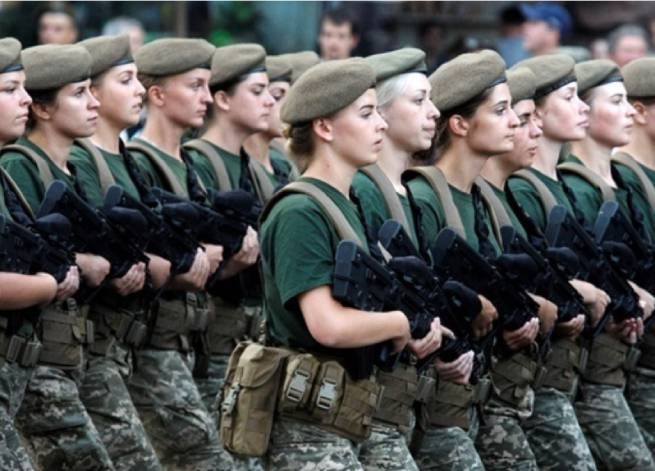Reducing the conscription age, mobilization of women and basic training, abolition of military service, who has the right to a deferment – MP Maryana Bezuglaya talks about these and other provisions of the bill on mobilization in Ukraine.
The Verkhovna Rada is developing a bill that provides introduction of military registration for women. Deputy Chairman of the Verkhovna Rada Committee on National Security, Defense and Intelligence Maryana Bezuglaya introduces on Facebook the current developments of the draft law.
Key innovation – registration of women aged 25 to 60 years. It is assumed that they are all will become liable for military service (as well as men), now only doctors and pharmacists are required to register for military service, the rest are optional. At the same time, the people’s deputy made it clear that the following could be mobilized for rear positions:
“For combat positions only at will, but signalmen, financiers, lawyers, personnel officers, cooks, etc., and not just doctors, are needed in the Armed Forces of Ukraine.”
Bezuglaya made it clear that the bill does not intend to clarify that these “non-combat positions” for women should only be in the rear units. That is, these can also be units that are on the front line. Among main innovations regarding Ukrainian women:
- Women must register with the military, and the registration procedure will be determined by the Ministry of Defense.
- If the bill is passed, women will be required to undergo basic combined arms training.
- During martial law, women will be involved in military service, but for combat positions – only voluntarily, if desired.
- Women will be exempt from basic military training, in addition to general grounds, in connection with pregnancy or child care.
The deputy also notes that The conscription age for mobilization will be reduced from 27 to 25 years. Grounds for deferment or dismissal from service:
- disability;
- having three or more children;
- if two military personnel have a child, then one of them has a deferment and the right to dismissal (male or female). That is, if a woman decides to go to military service, then a man can thus receive a deferment;
- presence in the family of a minor with a disability;
- the presence of an adult incapacitated child with a disability of 1-2 groups, as well as a wife or husband, parents of a wife or husband with a disability of 1-2 groups gives the right to a deferment (in this case, the person with a disability chooses who gets the deferment);
- trustees of a person with disabilities of groups 1-3 who have been declared legally incompetent;
- pregnant women and women on maternity leave receive a deferment or dismissal from service;
- only current or newly elected people’s deputies have grounds for dismissal;
- women and men whose close relatives died or went missing during the war.
The following will receive a deferment from mobilization:
- applicants for the first higher education who are less than 30 years old;
- all scientists with titles;
- all full-time teachers.
An important change in the new law: the police, the Economic Security Bureau and the penitentiary service will lose the right to deferment.
Project abolishes military service (those who were conscripts at the time of the introduction of martial law are demobilized) and introduces instead basic combined arms training up to three months for all citizens aged 18 to 25 years.
The mobilization powers of local authorities have been significantly expanded. During martial law, the rights of those evading mobilization will be limited. Bezuglaya did not specify what rights they intend to deprive, but earlier she asked how people feel about Persons liable for military service who have gone abroad will be deprived of citizenship and their assets will be seized. She also said that the National Police will be involved in the mobilization of citizens and issue them summonses. In addition, writes the publication “Country”, citizens liable for military service will be required to:
- provide information about your place of residence to the employer;
- undergo a medical examination during mobilization;
- independently appear at the CNAP/TCC SP to clarify the data;
- carry a military registration document with you at all times during martial law.
When working on a project, the places where subpoenas will be served are discussed:
- in TCC SP by representatives of TCC SP;
- at the place of residence by representatives of the TCC SP, police;
- at the place of work by representatives of the TCC SP, police officers;
- in public places by representatives of TCC SP, police.
The new law, as the draft envisages, will also oblige the military command:
- carry out mandatory rotation: a fighter must be on the front line (“at zero”) for no more than three months;
- follow the procedure for dismissing conscripts;
- carry out rotation in TCC (not all) after 3 years;
- appoint persons with engineering qualifications only to engineering positions.
A separate block in the bill will be devoted to demobilization procedure. The main innovation: the right to dismissal can be obtained after 36 months (3 years) of service during martial law. At the same time, upon reaching 24 months, of which 12 months in a combat zone, it will be possible to take vacation lasting 90 days without dividing it into parts, however, this will extend the period for obtaining the right to dismissal. Or don’t take a vacation and quit after 36 months.
Bezuglaya explained that this formula is being introduced in order to prevent the simultaneous dismissal of military personnel:
“If several tens of thousands quit at the same time, the Russians will break through the front.”
In this case, dismissal can be obtained early on the grounds already mentioned above: disability, three children, maternity leave, etc.
It is possible that in the final version of the bill (it has not yet been officially presented) the clause on the mobilization of women will be removed. Let’s not forget that everything Bezuglaya talked about is just developments for now. So all that remains is to wait for the Verkhovna Rada to adopt the final version of the new law on mobilization, and then return to discussing it.
Earlier, People’s Deputy Mikhail Tsymbalyuk appeared on air at the national telethon told on planned changes to the law on military service and mobilization. According to him, in this area they are preparing the following innovations:
- establishment of a 90-day leave with payment of allowances for persons returning from captivity;
- establishing the right to dismissal from military service for stateless persons or foreigners;
- establishing the right to dismissal from military service for persons with disabilities of the first and second groups;
- establishing the right to dismissal from military service or demobilization of female cadets who terminated their contract early;
- regulation of the right to a deferment from mobilization of teachers, teachers of higher educational institutions and students.







More Stories
There will be no forced return of Ukrainian men from abroad; the e-office for those liable for military service will start working on May 18
Will Europe forcibly return Ukrainian draft dodgers?
Xi Jinping's leverage: can China encourage Putin to stop the war in Ukraine